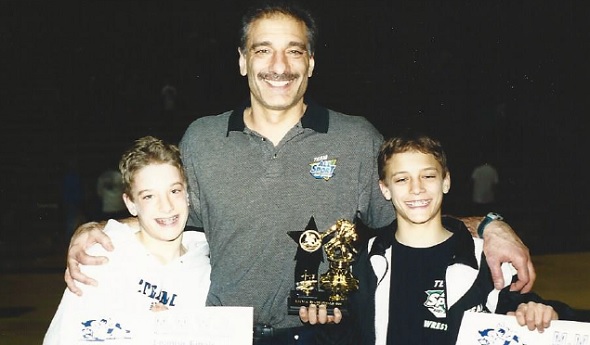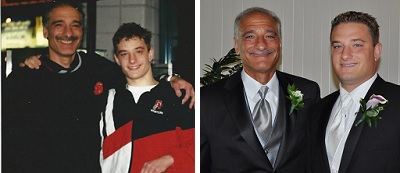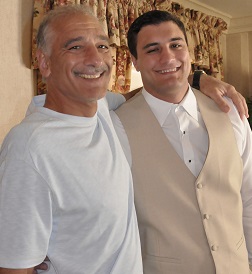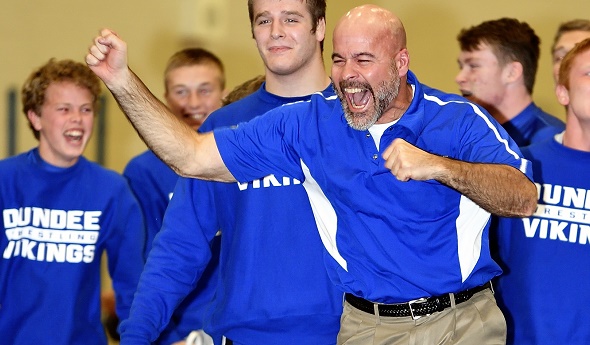
Coaching Cousins Build on Macomb Roots
By
Tom Markowski
Special for Second Half
January 18, 2018
MACOMB – Success must begin somewhere.
 And for the Macomb Dakota wrestling program, its beginnings can be traced to a church in Mount Clemens nearly 25 years ago.
And for the Macomb Dakota wrestling program, its beginnings can be traced to a church in Mount Clemens nearly 25 years ago.
Ed Skowneski, a longtime educator in Macomb County who was a football star at Wayne State University during the 1970s, got with a few buddies and formed a youth wrestling program named the Bad Boys Wrestling Club.
This program would eventually produce six MHSAA champions and approximately 20 others who reached the Individual Finals. It also helped inspire two of those wrestlers to become coaches at the high school level.
Eddie Skowneski, Ed's son, leads the Macomb Dakota program ranked No. 3 in Division 1 this week by Michigan Grappler. Nephew Anthony Biondo assists top-ranked Detroit Catholic Central.
Before the Bad Boys – which would eventually evolve into Team All Sport – there were pockets in the county where the sport thrived, such as Fraser High where Al Kastl had built a strong program. But for the most part, Macomb County was a step or two behind nearby counties such as Genesee, Lapeer, Oakland and Wayne, where the sport had well-established programs like Clarkston, Davison, Detroit Catholic Central, Hazel Park, Lake Orion, Montrose, New Lothrop and others.
Skowneski teamed with people like Bob Palazzolo, Rick Julien – an assistant under Kastl at Fraser who later became Fraser’s head coach – and later, Vince Biondo, Skowneski’s roommate in college, to organize a competitive youth program.
“We had some good kids back then,” Skowneski said. “We had six state champions come out of there. We practiced twice a week at the church, but it was more like a hall or reception room. After one year we moved to Fraser, Mark Twain Elementary (School), where I was a principal. That made it easier, for travel and everything. We had our own mats in the school, and it started to grow.”
 A team from Macomb County has yet to reach an MHSAA Division 1 Final, but they’re getting close. Last season Dakota reached a Division 1 Semifinal for the first time, and it was just the third time a Macomb County team had advanced that far in the top division/classification.
A team from Macomb County has yet to reach an MHSAA Division 1 Final, but they’re getting close. Last season Dakota reached a Division 1 Semifinal for the first time, and it was just the third time a Macomb County team had advanced that far in the top division/classification.
Two other county schools fared well last season, too, in other divisions. Warren Woods Tower lost in the Division 2 Final to Lowell, and Richmond won the Division 3 title.
Skowneski’s motivation to become a coach came from his son, Eddie, and, later, his nephew Anthony Biondo, Vince Biondo’s son. Eddie Skowneski got his start with the Bad Boys at age 9 with his cousin who is two years younger. The two became best friends and would become two of the county’s top wrestlers during the early to mid-2000s at Clinton Township Chippewa Valley.
Each would reach the Individual Finals three times. In 2003, Skowneski won the 140-pound title over fellow county wrestler Justin Petrone of Roseville, 1-0. Biondo was a three-time champion placing first at 103 in 2003, first at 112 the next season and first at 145 in 2006.
Skowneski would earn a scholarship to Michigan State University, where he was a three-year starter. Biondo went to University of Michigan and was a three-time NCAA Tournament qualifier. His best season came as a senior when he went 2-2 at the NCAAs and earned his 100th career win.
“Those Bad Boys days, those were some great times,” Anthony Biondo said. “It was a great group of kids. I just remember being in that church with Uncle Ed. I really wasn’t into wrestling when I started. I was into hockey and football. I started going there one day a week, and it just grew. My first year wrestling (at Chippewa Valley), I won the state title. It was just that one-on-one thing that I liked. My dad was a huge goal-setting type of guy, and I just kept at it.”
 Their wrestling careers didn’t stop after graduation. Skowneski became an assistant coach at Fraser for one season then went to Warren DeLaSalle for two as an assistant before becoming the head coach at Dakota in 2012. Biondo is in his seventh season as an assistant coach at Detroit Catholic Central, the top-ranked team and reigning champion in Division 1.
Their wrestling careers didn’t stop after graduation. Skowneski became an assistant coach at Fraser for one season then went to Warren DeLaSalle for two as an assistant before becoming the head coach at Dakota in 2012. Biondo is in his seventh season as an assistant coach at Detroit Catholic Central, the top-ranked team and reigning champion in Division 1.
Eddie Skowneski, 31, said he’s had a number of mentors throughout his wrestling career who have contributed to him becoming the coach he is today. His father is one, but he also said his high school coach John Jeffire at Chippewa Valley, St. Clair Shores Lakeview football coach Pat Threet and his college coaches all have had their influence.
When Ed Skowneski retired as school principal at Mark Twain in 2015, his son quickly found him a part-time job as his assistant at Dakota to keep him active.
“He’s always been a great coach,” Eddie said. “Coaching with my dad, it never really stopped. With him, it’s the little things. He always said, if you have good technique, you can beat someone who is more physical than you are. With my dad, he goes to each person and shows them the proper technique. With me, sure I want them to work and train hard. But I want my wrestlers to do it the right way.”
Ed Skowneski got out of coaching when his son went to high school. He said he had taken his son as far as he could and that it was better to have Eddie continue his progression with someone else as his coach.
Now that Ed’s back in it, coaching with his son no less, he couldn’t be happier.
“When he first got the job at Dakota, I thought of helping him but I just didn’t have the time,” Ed Skowneski said. “I’m enjoying it now. I’m not the head coach. He has the issues. I just work with the kids. It’s fantastic. It’s rewarding. We have a great group of kids and good parents.
“I look forward to the tournaments, which sometimes keeps me up at night. It’s nice that my son and I can do this together.”
 Tom Markowski is a columnist and directs website coverage for the State Champs! Sports Network. He previously covered primarily high school sports for the The Detroit News from 1984-2014, focusing on the Detroit area and contributing to statewide coverage of football and basketball. Contact him at [email protected] with story ideas for Oakland, Macomb and Wayne counties.
Tom Markowski is a columnist and directs website coverage for the State Champs! Sports Network. He previously covered primarily high school sports for the The Detroit News from 1984-2014, focusing on the Detroit area and contributing to statewide coverage of football and basketball. Contact him at [email protected] with story ideas for Oakland, Macomb and Wayne counties.
PHOTOS: Longtime coach Ed Skowneski stands with son Eddie (left) and nephew Anthony Biondo after a youth event when they were children. (Middle) Father and son hold up Eddie’s bracket sheet after he won the Division 1 championship at 145 pounds in 2006; to the right, they pose together during Biondo’s wedding. (Below) Ed Skowneski and Biondo, also before the latter’s wedding. (Photos provided by the Skowneski family.)

Roberts Drives Dundee to Chase Dream
January 8, 2019
By Doug Donnelly
Special for Second Half
DUNDEE – The thing that keeps Dundee wrestling coach Tim Roberts motivated isn’t another dual meet victory, matching up with state powerhouse Hudson in a conference meet or hanging another banner inside the Vikings’ gymnasium.
 Those things are nice, but what keeps Roberts going in his 20th season as the Dundee head coach is a certain two-time MHSAA Finals-qualifying wrestler from the mid-1980s who won 120 matches for Dundee but ultimately fell short of his goals.
Those things are nice, but what keeps Roberts going in his 20th season as the Dundee head coach is a certain two-time MHSAA Finals-qualifying wrestler from the mid-1980s who won 120 matches for Dundee but ultimately fell short of his goals.
That wrestler was Roberts.
“I’m always trying to prove myself, and I’m always trying to get better,” Roberts said. “When I think of myself as that kid who didn’t place at state, I do much better because I keep that hunger and desire. I need to learn more. I’ve got to get better at this.”
Roberts is already pretty good at what he does – a hall of famer, says Hudson coach Scott Marry, a seven-time MHSAA championship-winning coach himself.
“Coach Roberts is one of the best coaches I’ve ever coached against,” Marry said. “He gets his kids ready mentally and physically. You better have your team ready if you’re going to wrestle Dundee.”
Earlier this season, Roberts reached a career milestone – 500 career wins. He’s led Dundee to six Finals titles and six runner-up finishes, 19 District and 18 Regional titles. He’s coached 32 Individual Finals championship wrestlers and more than 140 all-staters. Under his leadership, Dundee also is approaching 20 Lenawee County Athletic Association titles.
The numbers don’t tell the full story about Roberts, however.
“I could write a book about Tim and how great a coach he is,” said Dundee athletic director Tom Oestrike. “His coaching profile speaks for itself, but what is even more impressive are the type of young men he has helped build in his career – men of selflessness, character and discipline.”
When Roberts wrestled at Dundee, he was a 98-pound freshman who grew to compete in the 126-pound weight class as a senior.
“We were a solid program at the time, (but) winning state was an impossible dream back then for sure,” Roberts said.
“I wasn’t bad at wrestling. I was pretty good. Compared to the guys we have now – I wasn’t as good as them. I thought I was pretty good, but I didn’t accomplish the goals that I wanted to.”
After high school, he enlisted in the Army. It was during that time that he got the coaching bug. He realized he wanted to help young student athletes learn how to get the most out of their careers.
“When I was in the military, I learned a lot about building myself into something and I wanted to share that information,” he said. “I thought about wrestling a lot and how I really didn’t accomplish the goals that I would have liked to, and I wanted to help other people. I had this desire to try to help. I felt like I had a knack for it.”
After his first year as an assistant coach, Dundee changed wrestling head coaches and Jim Wittibslager got the job. Roberts asked him if he could stay on as an assistant.
Wittibslager is a hall of fame coach in his own right. He compiled a record of 333-36-3 in two stints as the Dundee head coach. The Vikings won four straight MHSAA Finals titles during his tenure, from 1995-98.
“We went from a team 4-21 with zero state qualifiers, and by the fifth year we were state champs with 14 state qualifiers,” Roberts said. “It was quite a building process. It was lot of fun to go through and learn. Winning state went from an impossible dream to something that ‘Oh yeah, we could do this.’ We built ourselves into that level.”
Coaching with Wittibslager was a career-changer for Roberts.
“That was crucial in my development in how to coach,” he said. “I thought I had a knack for helping people and I had a little talent in that area, but I learned so much about what it takes, the work ethic and how to win and how to think like a winner.”
Admittedly, Roberts isn’t the same coach he was two decades ago. The sport has evolved significantly.
“I don’t coach now like I did 20 years ago, I’ll say that,” he said. “You grow with the times or you get left behind.”
What hasn’t changed during that time is Roberts’ attention to detail, his passion for coaching the right technique and getting his team ready for meets. Practices now include time in the weight room, warming up with some gymnastics moves such as back handstands, leaps and cartwheels; and, of course, technique.
“We still do conditioning,” he said. “We do quite a bit of that.”
Roberts believes one thing that sets wrestlers apart from each other is how far they can push themselves on the mat – when they reach the point where they feel they don’t have any more strength or ability, they find it.
“The only way you know if you can (push yourself) is by getting (to that point). That, as much as anything, will win you matches,” he said.
Maintaining that success has never been easy. Dundee typically has about 20 wrestlers out each year, a comparably low number to some other high-level programs. But that is where Roberts does his best work. Coaching at the high school level, he said, isn’t about coaching extraordinary athletes – it’s about coaching the average ones.
“It’s been an endless process for 20 years to keep trying to get better at this,” he said. “Average people are who you are coaching. That’s what coaching high school is, I think, learning how to work with the average person. Then, once in a while, you get to work with the exceptional person and that’s fun.”
Despite the enormous success during his 20 seasons at Dundee, Roberts has experienced the same highs and lows as any other coach.
“Lots of highs and lows,” he said. “Lots of times of feeling great, then you get humbled. Then you start feeling great again and then humbled again.”
Roberts coached Dundee to a Division 4 championship in 2001 and Division 3 titles in 2007, 2013, 2014, 2016 and 2018. Last year’s team was ranked nationally and had 14 Individual Finals qualifiers.
“Every one of those (championships) is like the best day of my life,” Roberts said. “Every time. It’s such a great feeling in the end that it all came together, and everything did work, and you did get it all done. A lot of things have to go right. It’s not easy.”
Roberts, 50, isn’t planning on stepping away from coaching any time soon. He’s also not stopping to think about reaching 500 career wins any time soon. He’d rather think about that high school wrestler who missed out on winning a state championship – but has had a remarkable impact on so many others.
“That’s for when you are done (coaching),” he said. “Right now, I’m still trying to get better and trying to work on my weaknesses as a coach and always seeking out how I can be better at this. When you’re done is when you get to reflect.”
 Doug Donnelly has served as a sports and news reporter and city editor over 25 years, writing for the Daily Chief-Union in Upper Sandusky, Ohio from 1992-1995, the Monroe Evening News from 1995-2012 and the Adrian Daily Telegram since 2013. He's also written a book on high school basketball in Monroe County and compiles record books for various schools in southeast Michigan. E-mail him at [email protected] with story ideas for Jackson, Washtenaw, Hillsdale, Lenawee and Monroe counties.
Doug Donnelly has served as a sports and news reporter and city editor over 25 years, writing for the Daily Chief-Union in Upper Sandusky, Ohio from 1992-1995, the Monroe Evening News from 1995-2012 and the Adrian Daily Telegram since 2013. He's also written a book on high school basketball in Monroe County and compiles record books for various schools in southeast Michigan. E-mail him at [email protected] with story ideas for Jackson, Washtenaw, Hillsdale, Lenawee and Monroe counties.
PHOTO: Dundee wrestling coach Tim Roberts and his team celebrate one of the many successful moments during his two decades leading the program. (Photo by David Schankin.)

